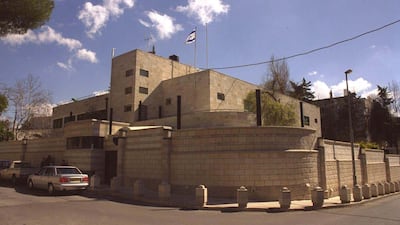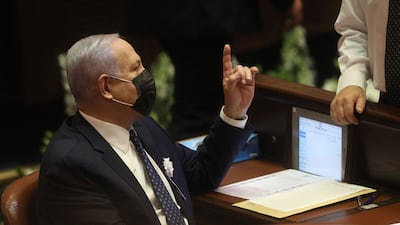With a war, protests and political upheaval, 2021 has been marked by violent and unexpected events for Israelis and Palestinians.
The darkest month of the year was certainly May, when the Israeli military and Gaza militants fought an 11-day war which had ramifications for people well away from the line of fire.
The conflict was preceded by weeks of protest in occupied East Jerusalem, initially sparked by the Israeli police refusing to allow Palestinians to gather at the Old City’s Damascus Gate during Ramadan.
The rallies coincided with an increase in demonstrations against a lawsuit filed by Israeli settlers to evict Palestinians from their homes in the Sheikh Jarrah neighbourhood. The case is before Israel's Supreme Court, which has yet to issue its decision.
More than 1,000 Palestinians and a few dozen Israeli police officers were wounded in Jerusalem before the war broke out, according to paramedics and police.
Thirteen people in Israel and 261 Gazans were killed during the conflict, UN figures indicate.
Intercommunal violence broke out across Israel. In the West Bank, the UN documented 34 Palestinians killed by Israeli forces during May and one case of a Palestinian killing an Israeli.
The violence followed a landmark report by Human Rights Watch, which accused Israel of the international crime of apartheid against Palestinians. The charge, which the government denies, was also laid by Israeli rights group B'Tselem in January.
While 2021 saw a shift in the language used by NGOs, Israel’s occupation of East Jerusalem and the West Bank, as well as its blockade of Gaza, continued this year without significant policy changes.
Israeli politicians were largely focused on their own internal strife, with March resulting in the fourth inconclusive election in less than two years.
With voters exhausted at the prospect of yet another trip to the polling station, politicians from across the political spectrum united to build an unprecedented coalition.
An Arab-Israeli party entered government for the first time, working alongside left-wing legislators in an eclectic cabinet led by right-wing Prime Minister Naftali Bennett.
They were united by one aim: to oust Benjamin Netanyahu.
After 12 consecutive years in office, the former prime minister was consigned to the opposition in June. Mr Netanyahu’s political misfortunes have played out against the backdrop of his continuing trial on corruption charges that he denies.
While Israel was getting its political house in order, there were hopes at the start of the year that Palestinians would vote for the first time in 15 years.
A symbolic end to the Netanyahu era - in pictures
Legislative elections were slated for May 22, only to be scrapped at the end of April by Palestinian President Mahmoud Abbas. The elderly leader blamed Israel for failing to guarantee voter rights in East Jerusalem, though his detractors claim he feared losing the elections.
The same night the Palestinian president cancelled the vote — April 29 — Israel experienced the worst civilian disaster in the country’s history.
Forty-five people were crushed to death during a Jewish holiday on Mount Meron, in northern Israel, where an estimated 100,000 worshippers had gathered. The new government ordered a state inquiry, which started hearing witnesses in August.
While Mr Bennett’s coalition has been labouring over home affairs, it has also been trying to forge relationships with its closest ally in Washington.
Since taking office in January, US President Joe Biden has sought to reverse some of the controversial policies enacted by his predecessor Donald Trump.
Spyware firm blacklisted
At the end of the year, Israel remained at loggerheads with Washington over its plans to reopen its consulate to the Palestinians in Jerusalem.
Bilateral relations were further strained in November by the US blacklisting Israeli spyware firm NSO, whose technology has allegedly been misused to target activists around the world.
The Palestinians have also been wooing the Biden administration, which in April restored funding to UNRWA, the UN agency for Palestinian refugees.
By the end of December, ties with Washington had largely returned to their pre-Trump norms for both Israelis and Palestinians.
As in the preceding few years, 2021 passed without peace talks.





















